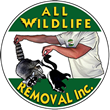Squirrels love to make nests in warm, dry attics—and they’re small and smart enough to find entry points on your roof if it isn’t completely secure. If you’re hearing noises from your attic, such as chewing, scratching, and skittering, there’s a good chance you have a squirrel living in your home.
This is bad news. Squirrels can cause structural damage, bring in parasites, and leave behind feces and urine. Though you should make it a priority to evict the squirrel, you shouldn’t attempt to remove it on your own. Removing a squirrel is a job for the pros. Here’s why.
Squirrel Repellents Don’t Work
Many homeowners attempt to rid their attics of squirrels by using squirrel repellents. These methods are cost effective, so they’re often the go-to “solution.” However, squirrel repellents aren’t solutions at all. Leaving the radio on, using pulsating strobing lights, trying home-made squirrel repellent recipes, or using ultrasonic repellentsisn’t effective. These methods won’t work.
Poisons Rarely Work on Squirrels
The squirrel is a rodent, so you might think you can get rid of your wildlife problem by using rat poison. However, most available poisons on the market aren’t effective on squirrels. And because squirrels are seed eaters and only eat outdoors, they rarely eat rat poison.
Not only will using poison be ineffective, but it can also be dangerous to the pets in your home, children, and other wildlife.
Trap and Relocation Is Dangerous
Many people mistakenly believe trap and relocation is the most humane and ethical way to get rid of problem wildlife. This is a feel-good myth. Trap and relocation doesn’t work. Studies have shown that animals placed in foreign locations have a limited chance at survival. They don’t know where to find food and water sources and could die of starvation. In addition, you could unknowingly move the squirrel to a location filled with its natural predators.
There Might Be Babies Nearby
Another reason removing a squirrel is a job for the pros: there might be babies hidden in your attic. We’re currently in the midst of squirrel baby season. If there is a squirrel in your home, there’s a high likelihood that make your house its home in order to raise its babies in a safe place.
Squirrel babies are born naked, deaf, and blind. They’re completely dependent on their mothers for their survival. Evicting a mother squirrel can leave her helpless babies behind. Without their mother, they’ll die.
When removing a squirrel, it’s best to call the professionals who can inspect your home, look at every possible hiding place for nests, and hand-remove and reunite the babies with their mother.
Other Squirrels Will Come In
Even if you were to successful remove a squirrel from your attic on your own, this doesn’t solve the larger problem. The wild animal found a way into your home in the first place, which means there’s an entry point somewhere. If you don’t identify and seal up entry point, the same squirrel—or other wildlife—will surely find the entry point and get in.
A humane wildlife control company’s technicians will not only safely remove the squirrel and any babies from your home, but they’ll also work on repairing and restoring your roof and attic. They have the expertise and experience required to find even the smallest and most well-hidden entry points and seal them up effectively to prevent future re-entry. They’ll also repair vulnerable areas in order to guarantee a wildlife-free home for years to come. When you call the professionals, your squirrel problem will be taken care of for good, the first time around.
Do you need wildlife removal services? Request a quote today!
